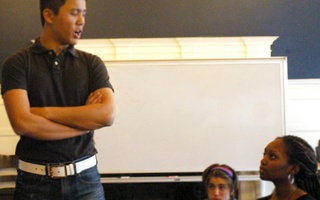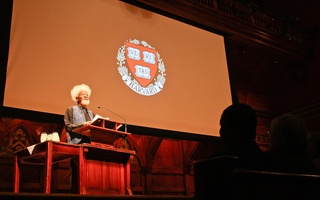The idea of existence is a theme that dominates his body of work.
The Swedish Academy, the committee that selects the Nobel Prize winners, cited Soyinka in 1986 as someone “who in a wide cultural perspective and with poetic overtones fashions the drama of existence.”
Of his more than 30 published works, the Academy made special mention of Soyinka’s plays, in particular A Dance of the Forests (1963) and Death and the King’s Horseman (1975).
A Dance of the Forests is described by the Academy as “a kind of African Midsummer Night’s Dream with spirits, ghosts and gods. There is a direct link here to the indigenous ritual drama and to the Elizabethan drama.”
Death and the King’s Horseman, the Academy wrote, is “in the nature of an antique tragedy with the cultic sacrificial death as theme. The relationship between the unborn, the living and the dead, to which Soyinka reverts several times in his works, is fashioned here with very strong effect. Soyinka confirms his position as a centre of force in drama.”
Other works which have received critical acclaim include Myth, Literature and the African World (1976), a collection of poems, and The Open Sore of a Continent: A Personal Narrative of the Nigerian Crisis (1996), which Soyinka adapted from a lecture series he gave at Harvard. He has also written two well-reviewed autobiographical works, Aké: The Years of Childhood (1981) and Ibadan, The Penkelemes Years, A Memoir: 1946-1965 (1994).
Soyinka says he never anticipated that he would be the central figure in Aké. He says he had hoped to focus the story of his childhood around an uncle, but the man died before Soyinka could record his reminiscences.
“I intended to write about a certain period which was vanishing and about which I felt a little bit nostalgic, and I was going to use the figure of an uncle of mine who actually appears in [Aké],” he says.
“And then, just when I wanted to start, he died on me. And so, I dropped it. But the need, the need to set down that period [remained] because everyday landmarks vanished, certain modes of life vanished, certain rhythms of existence vanished, and so I decided I’d weave that period around my own self,” he says. “That’s really how that first biography came about, it was never intended to be my biography.”
He says he wrote Ibadan, his second memoir which depicts his political coming-of-age, in a “white heat” of four weeks during his second period of exile because he didn’t know if he would survive the bitter conflict that was intensifying in Nigeria.
During that struggle, Soyinka’s colleague, Ken Saro-Wiwa, who advocated the autonomy of the Ogoni people and fair distribution of the nation’s wealth, was arrested on false charges of treason and murder and hanged with eight of his companions.
This year, Soyinka will be working on his third memoir. At his disposal are his papers, which Harvard acquired in 2003 and which are kept in Houghton Library.
Soyinka says he finds it very hard to talk about his current projects because “when I write, when I create, it’s an entirely solipsistic operation.” For this reason, all he will say about the work is that he has selected its title with his editor.
When asked if it is more challenging to write fiction or memoir, he says, “I think trying to write a memoir is a lot more difficult because you have to organize events which do not pursue any pattern.”
The best way to describe his approach to writing, he says, is by contrast. “There are many writers I know who get up every morning, who drink either their espresso like I do or maybe something more innocuous, and sit down at their desks and they’re not getting up until they’ve put down a few pages, but I’m very different,” he says. “I write only when I feel ready to write…and sometimes I’m not able to sit down and start writing for upwards of a month, two months, three months after I have that impulse to sit down and write.”
Read more in Arts
YellowArrow Aimed at Building Art CommunityRecommended Articles
-
Du Bois Legacy CelebratedPoet Laureate Rita Dove, Nobel Prize-winning author Wole Soyinka and President Neil L. Rudenstine all praised W.E.B. Du Bois yesterday
-
Nobel Laureates Honor Wole Soyinka at IOPNobel laureates Nadine Gordimer, Derek Walcott, and Toni Morrison joined hundreds of audience members last night at the John F.
-
Author Speaks About SudanNigerian author Wole Soyinka, the first African to win the Nobel Prize for Literature, argued that the Arab section of
-
 Death and the King's Horseman
Death and the King's Horseman -
 Committee on African Studies Commemorates Mandela Three Months After Death
Committee on African Studies Commemorates Mandela Three Months After Death













